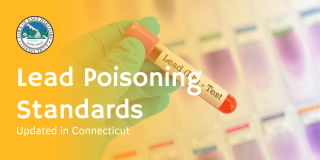Lead Poisoning Standards Updated in CT

Universal blood lead screening is mandated in Connecticut. All children between the ages of 9 and 35 months must be tested annually for lead in blood. Childhood Lead Poisoning is the most common pediatric public health problem, yet it is entirely preventable. Once a child has been poisoned, the impairment it may cause is irreversible. Lead harms children's nervous systems and is associated with reduced IQ, behavioral problems, and learning disabilities, among other health outcomes. While lead paint in homes built before 1978 continues to be the most common source of lead exposure, there are other sources of lead that can poison a child or adult. No amount of lead is safe for the body.
In 2022, new state legislation passed to update lead poisoning standards in Connecticut and these changes went into effect on January 1, 2023. If a capillary blood lead test is elevated (equal to or greater than 3.5µg/dL), healthcare providers must confirm with a venous blood lead test. Children should be re-tested until the blood lead level is below the blood lead reference value of 3.5μg/dL. To learn more about the act reducing lead poisoning, please reference Public Act No. 22-49.
Additional Resources:
- Childhood Lead Poisoning Prevention
- Facts About Lead
- Resources for Parents
- Resources for Homeowners
- Resources for Childcare Providers
For questions about lead testing, screening, or the updated lead poisoning standards, please contact the East Hartford Health Department at 860-291-7324.

